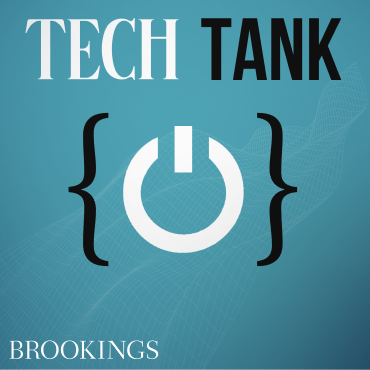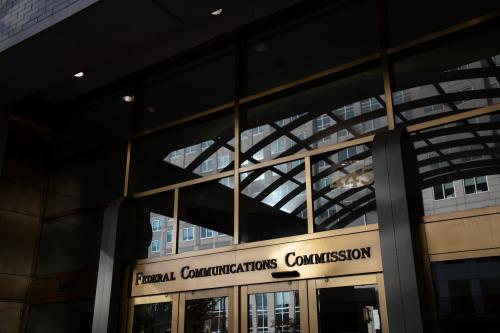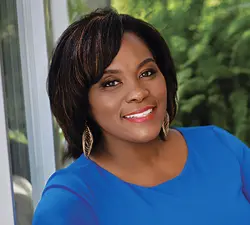TechTank, a biweekly podcast from the Center for Technology Innovation at Brookings, explores today’s most consequential technology issues. Moderators Nicol Turner Lee and Darrell West speak with experts and policymakers to share data, ideas, and policy solutions that address the challenges of our digital world.
For the last four years under the leadership of former Chairwoman Jessica Rosenworcel, the Federal Communications Commission (FCC) focused on closing the digital divide, advancing the nation’s infrastructure assets, and enacting safety and security measures to ensure the commission could withstand the rising increase in natural disasters.
The agency is now led by Trump-appointed Chairman Brendan Carr, and though his priorities for the commission are still taking shape, some actions have made his vision clear. Days into his role, Carr began rolling back diversity-related initiatives from advisory councils to peering into the practices of privately-owned companies. Carr has also come forth about his inquiries into censorship by major media conglomerates, and he has restated an interest in rolling back Section 230.
In this episode of The TechTank Podcast, co-host Nicol Turner Lee speaks with Tom Wheeler, visiting fellow at Brookings and former chairman of the FCC, about Carr’s actions thus far, what might come of them, and what to expect from the agency going forward.
Listen to the episode and subscribe to The TechTank Podcast on Apple, Spotify, or Acast.
Transcript
CO-HOST NICOL TURNER LEE [00:00:01] You’re listening to Tech Tank, a bi-weekly podcast from the Brookings Institution, exploring the most consequential technology issues of our time. From racial bias and algorithms to the future of work, Tech Tank takes big ideas and makes them accessible. Welcome to the Tech Tank podcast. I am co-host Nicol Turner Lee, and today we’re talking about the first 100 days of the Federal Communications Commission, or the FCC for short. This is the independent agency with oversight over the nation’s communications infrastructure, like telephone, media, and broadband. And in the last few weeks, we have a new chairman. Trump has appointed Chairman Brendan Carr, who was formerly a commissioner, to lead the agency. The prior chairwoman, Jessica Rosenworcel, her focus was on closing the digital divide, advancing the nation’s infrastructure assets in tandem with the U.S. Department of Commerce, focusing on various safety and security measures to ensure the commission could withstand the rising increase in national disasters, as well as consumer protection needs, including getting rid of robo-calling. And today, we now have a new leader in charge. While still being sorted out as to the main priorities of the Carr Commission, two things are very clear, my friends.
Carr was the author of the communications chapter for Project 2025 and just days, not hours, days, or maybe it should have been hours because it was that quick, into his role. He has rolled back diversity related initiatives from advisory councils to recently peeking into the practices of privately owned companies when it comes to DEI. Carr has also come forth about his increase into censorship by major media conglomerates, as well as a restated interest in reviewing the credulity of Section 230, which those of you who don’t know, is sort of the protector of big tech companies when it comes to liability on their platform. Now these are just some of the early actions, but I’m sure there will be more announcements to come like all of you out there. One of the things that we always have to pay attention to is what is coming at us and at what time. But I do have to say this before I jump into our next cast here. There has been some recent interest in re-establishing spectrum authority for the commission, which could be a good thing because we have not had that for quite some time. And if you are listening to me by wireless device, you need that spectrum. So I’m joined today by my friend and colleague who’s a visiting fellow at Brookings and former chairman of the FCC under President Obama, Tom Wheeler. Listen, he’s also the author of two books. “Tech Lash” and “From Gutenberg to Google and On to AI”, both published by the Brookings Press. Hey, Tom, thanks for joining me.
TOM WHEELER [00:02:59] Hey, Nicol, great to be with you. Thanks for inviting me.
CO-HOST NICOL TURNER LEE [00:03:01] Oh, always. And these are your issues, but I want to start with Spectrum, okay, since I ended there, because I know that the scarcity of this asset has been part of the FCC’s efforts to ensure wireless connectivity for individuals, enterprises, and institutions. So this month, we did hear Carl say that he’s going to actually restart some Spectrum options of some of the key bands that enable 5G, Tom. How feasible is this? Because I think we’ve been at a stall worth because Congress has been the holdup. So we’d love to hear your advice on whether or not we’re gonna get more spectrum under this new FCC.
TOM WHEELER [00:03:37] Well, step one is the FCC needs to have the congressional authorization to auction the spectrum, to run an auction process, to assign it to various licensees. And that for the last several years, for some unimaginable reason, Congress allowed to lapse and has not been in place. We understand that the, The continuing resolution that hopefully is going to come out shortly will restore that authority and that makes sense. The broader issue, though, is where’s the spectrum pipeline? Spectrum is like the old Will Rogers joke where he said, I’m putting all my money in land because I understand they ain’t making it no more. Well, you know, there’s not. spectrum that is being created anew, what has to be done is to reallocate spectrum that’s being used for one purpose to another purpose. And that’s a job that really isn’t the job of the FCC, but a job that is overseen by the Commerce Department under the supervision of the White So we need to have some decision -making coming out of that environment. to fill the spectrum pipeline. In the interim, there will be, there’s the opportunity to have some spectrum that the FCC recaptured and called the AWS -3 spectrum. There’s the opportunity for the FCC to perhaps in looking at the SES Intelsat merger of the satellite companies to say, Well, can some of that spectrum be repurposed? But if you want to talk about big 5G and then 6G spectrum for mobile needs, we need to have a new chunk of spectrum that gets made available. And right now that pipeline does not exist.
CO-HOST NICOL TURNER LEE [00:05:50] sounds like you know there’s some optimism that perhaps he can move the ball on this because compared to you know countries like China we’re sort of behind the eight ball when it comes to having available spectrum so I can appreciate that Tom and and obviously the the time is probably right to do so moving on to space I mean we think about spectrum we also Tom haven’t thought about the other s -word which is space in the same breath I feel like we’re talking about spectrum and space, and if you say that 10 times, you’re going to be tongue -twisted. CAR, not surprisingly, has also asserted more rules to support space -enabled broadband and other activities. Under the former chairwoman, we did have the Institution of the Space Bureau, but how feasible is it going to be for low -Earth orbit satellites, or LEOs, to be helpful in achieving the nation’s connectivity goals? Is it going to be affordable and too niche? I mean, that’s what I wonder about, right, Tom? Where are we going with Space Tube?
TOM WHEELER [00:06:47] Well, I think one of the answers that you’ve got to look at there is that who’s the biggest provider of these low -Earth orbit satellites, and that’s Elon Musk. And it seems to me as though Elon Musk has a large voice in this administration, and therefore I would expect that he would have a large voice in space policy. it’s kind of strange that the FCC ends up being a regulator of space because it regulates access to the spectrum for the signals that come out of space. You know, the FAA worries about launches into space. The FCC worries about the airwaves coming out of space. and I wouldn’t be surprised to see that in this administration we see some kind of iteration of a soup -to -nuts space policy, if you will, but I think low -earth orbit satellites have a role to play in that in the United States as well as around the world.
CO-HOST NICOL TURNER LEE [00:07:56] And that’s so interesting that you would suggest that. And I never thought about that, Tom. You’re making sense of that, right, in terms of the regulatory regime over space. I mean, is there some conflict if the FCC does the in and the out, you know what I mean, and sort of takes that responsibility? Or is that something that you think that this White House may move to the administration in terms of purview over LEOs?
TOM WHEELER [00:08:20] The broader question is, with or go with space, how are we going to handle all of the junk that is floating around in space? How are we going to handle satellites that can be interfered with by other satellites? How are we going to deal with, yes, the potential, but also the threat in space. And it’s, you know, one of the skill sets that Elon Musk does have is a vision about how to use space. And we ought to have a national discussion of just what that space policy should be.
CO-HOST NICOL TURNER LEE [00:09:09] That makes so much sense. And I’m looking forward to having you come back and maybe Darryl or my co -host can join because both of you and I have had some interest in this for a while. Now, let’s go to the other issues. And you recently dug into this issue of censorship as well as diversity increase. And I’m really curious to sort of hear your take on this. So for people who don’t know Tom, let me tell you a little bit about Tom Wheeler. First and foremost, he’s an incredible leader and led the FCC under his term. with the same type of gravita I think that most chairmans do, but he also knows the policies and what’s under the FCC purview. And you recently published this blog on the Tech Tank Newsletter about censorship, where you wrote that the power of the FCC chairman to interpret the vague public interest doctrine invites its politicization. In the case of the Trump lawsuit, you’re referring to CBS and the inquiry there right now, its potential for abuse in private matters. simply rattling the chairman’s saber can have a chilling effect on editorial and business decisions. And Tom, this has resonated with me even more so as we see many of the media companies sort of, you know, pull back a little bit, either a fear of retaliation or with some level of intimidation. Talk to us about what do you mean by this in terms of the vague interpretation of the public interest doctrine when it comes to media, and how do you see like recent actions against, you know, CBS. sort of parlaying into the belief that the commission has the authority to sort of reinterpret that statute. Now, Tom, I know I just gave you a blog in that question, okay? But I thought it was important for people to know what you’ve been writing about and thinking about when it comes to this quote unquote argument that the chairman is making in terms of censorship.
TOM WHEELER [00:10:55] Well, the question is how long is our podcast, but let me see if I can summarize it here, Nicol. Let me see if I can. The day after President Trump announced that Brendan Carr would be chairman. And by the way, let me just say here for a second. I mean, Brendan Carr is, this is not an issue of personalities. Brendan Carr is a bright, creative, personable person who I’ve always had a great relationship with. Doesn’t mean we agree on policy, however. And one of the things that… he did immediately after being named by President Trump was he put out a post on X in which he talked about ending what he called the censorship cartel. And in so doing, he was engaging in, I guess, what you could only call the culture war. And I think he was perverting the concept of censorship to conflate it with things that may be more meeting the political goals of the Trump administration. You know, true censorship is the state’s involvement in First Amendment protected speech. It’s a government coming in and saying, no, you can’t do that. The term, however, has been politicized in this. tweet and elsewhere to be an attack on the exercise of First Amendment rights through editorial decisions. The regulatory leverage that Chairman Carr asserts that he has over that is the so -called public interest rule. You know, the FCC, the Statute of the Communications Act, says the FCC’s decisions are to be made in the, quote, public interest convenience and necessity. The public interest is a highly fungible term. It depends upon… who is making the decision. It is vague beyond belief. And those vagaries are invitations to abuse and, I mean, Antonin Scalia in a Supreme Court decision that he wrote when he was on the Supreme Court said that exactly, that vague statues are invitations to abuse. And it appears as though Chairman Carr is making decisions about the behavior of those who deliver information to the American public based on his interpretation of what is the quote.
But the public interest isn’t defined, and we don’t know how he defines it. If he defines it in terms of these kind of culture war issues, that’s one thing. But the quote that you read from a minute ago, what I was trying to say is that we’ve moved from the, the censorship cartel, which Chairman Carr sounded off about, to the coercion cartel, where the FCC, the chairman of the FCC, is unilaterally making decisions as to constitutes the public interest in the area of delivering information to consumers. And my concern is that the effect of this is that he is controlling what people can hear by coercively influencing what people say. And when, for instance, in the CBS lawsuit that, you know, Donald Trump, as a private citizen, sued CBS for $20 billion for an alleged editing of the 60 Minutes interview with Kamala Harris that he thought was election interference. And Chairman Carr has said… Yes, those issues, which he brought back to the FCC by reinstating a complaint made by a group that was parroting the Trump lawsuit in a complaint to the FCC that was dismissed by the previous chairman, he brought that back and he said, yep, I think that the ongoing question about whether the FCC should approve the transfer of CBS licenses in the sale that’s going on right now, whether that gets approved is very much involved with this question of how does the, how does CBS resolve the dispute in terms of their behavior. And that’s a dangerous precedent, it seems to me. um and and and it to his credit the chairman has said really what we need to have is we need to have a proceeding that comes up with a definition of what is the public interest when we’re talking about it in this kind of uh of a of a context uh unfortunately he has not moved forward uh on that suggestion in it, therefore, remains this kind of vague concept that, as Justice Scalia said, can lead to abuse.
CO-HOST NICOL TURNER LEE [00:17:34] Well, and that’s the thing that I find so interesting, and I loved your piece on this. And I’ve been also like trying to figure out, you know, why this has become such an important concern of the chairman and the administration. I mean, to your point, do we want to kind of go through this every time that there’s a disagreement of an editorial decision of a private company? And it seems to me in this particular commission. We’re starting to see, Tom, what I consider to be sort of intrusion into the practices of private companies that are in media, just kind of staying on this question of public interest. As I mentioned, the Chairman rolled back diversity equity inclusion initiatives that were sort of baked into the agency’s expectation of having universally available communication. But yet we just saw a trend that they’re soliciting comments from private companies on whether or not they have DEI practices in hiring or otherwise. I mean, is this sort of along the same lines of censorship or is this something different when it comes to sort of challenging the efficacy of how private companies should be structured or what they should be focusing on?
TOM WHEELER [00:18:50] The chairmanship of the FCC is an incredibly powerful position in that you get to make decisions for the agency. And it is clear that what Chairman Carr has done is to, on the question of DEI, is to follow the instructions of the White House, abolish any DEI initiatives within the FCC itself. which to my way of thinking is tragic. And then to turn to those he regulates and say, hey, I don’t like the fact that you’re promoting diversity, equity and inclusion. I don’t like the fact that you’re promoting fairness and full participation in the economy. and I’ll be watching how you deal with these things when I consider various regulatory issues. And I go back to the coercion issue that I was raising before. This is the concern that you coercively can influence And let me just tell you, as an example. GlaxoSmithKline, the big pharmaceutical company, headquartered in the UK. has changed their DEI activities, taken it off of their website, said they’re not promoting it anymore, ended a mentorship program for women. ended an entry -level program for low -income British citizens because they were afraid that it would violate what Donald Trump was saying about DEI in the United States, which happens to be their biggest customer. That is outrageous. It is tragic. And what he has done then, what Chairman Carr has done, is to turn around to the companies that he regulates and say. I’ve eliminated DEI at the FCC. I don’t like the fact that you’re promoting DEI in your activities. If you want to gain favor with me, you need to eliminate your DEI practices. Talk about regulatory micromanagement. Right, right. Talk about the absolute opposite of the deregulation. that the Trump administration promised. Now you’ve got a regulatory agency head micromanaging the human resources department of various companies by coercion, not by specific instruction.
CO-HOST NICOL TURNER LEE [00:22:17] Yeah, I mean, look, that part is, how do I say it? That part right there is so interesting. I’m working on a piece on that, right? Because part of it is, if the FTC decides, okay, we’re not gonna do DEI, you know, via, you know, White House, the former White House mandate or pull back the appropriation, that’s one thing. But it’s almost like me scolding somebody else’s child. I don’t have any right to do that because I don’t know what goes on in another person’s household. and I think I would want the same of my own children. But that’s so interesting to me because what it suggests is that, and Tom, you were chairman, I just came out of MMCC with David Honig. That’s my close legal experience and how I learned about the FCC rule -making process and how to read a filing. But aren’t there equal opportunity rules that the FCC has that are part of their. mandate to ensure that everybody has universal access to communications. I mean, wasn’t that part of why this agency was formed? Because back in the days, we all needed access to rotary telephone for 911. And we still need to make sure with the EEO rules that people see on television, people who represent their communities, not just by demographics, but by, you know, community background or gender. I’m just so confused, Tom.
TOM WHEELER [00:23:37] or disability, let’s not forget this, you know? I mean, so, you know, one of the things that I did when I was chairman is we wanted to make sure that we had a full opportunity. Right! for for all Americans to participate and and whether they’re you know disabled or or ethnically one ethnic group or another and and it’s a it’s a simple concept because in multiple places throughout the communications act it says the purpose of regulating communications one of the is to assure diversity, diversity of ownership, diversity of voices, diversity of hiring. And so this is why I fear that really what we’re seeing at the FCC is the imposition of culture wars on how companies who need to come before the FCC and ask for permission to do various things or to merge or whatever, that the first question now becomes, okay, where are you on the culture war issues?
CO-HOST NICOL TURNER LEE [00:25:00] I think that’s strange. Yeah, it is. I mean, what do you think the role of the other commissioners under this FCC will be? We obviously don’t have the fourth commissioner installed from the current party.
TOM WHEELER [00:25:10] Well, there are two answers. I think there’s two answers to that, Nicol. There’s two answers. Answer number one is that is the chairman Carr has been very artful in how he has done everything thus far without a commission.
CO-HOST NICOL TURNER LEE [00:25:21] Yeah, I was going to say there’s been no consensus exactly.
TOM WHEELER [00:25:24] And, I mean, it’s an example of the vast powers of the chairman. All these things we’ve been talking about, there hasn’t been a commission vote on any of these things about censorship, about DEI, or whatever. The chairman has just said, I’m going to move forward. But there’s a bigger issue here, which is that the president has issued two executive orders. And the Justice Department has issued a ruling that has the following effect. First of all, the FCC, which has always been an independent agency, you may be appointed by the president, but you don’t report to the president, that has changed. And the president has said that all these independent agencies now report to him and need to have White House preapproval for anything that they do. Secondly, the next day, the president issued an executive order that said that his heads of agencies that he appointed now have the unilateral authority to look at all of their rules and go through and eliminate anyone they want to eliminate, which of course see the preceding EEO, which is the message as to what to eliminate comes from the White House. And then thirdly, the Trump Justice Department has issued an opinion saying that the president has the authority to terminate without cause any commissioners of independent agencies. And Brendan Carr has fallen in behind that saying, oh yes, the Communications Act was written at a time when that wasn’t a. uh a policy and so the president ought to have the right to fire commissioners and so you have a sort of damocles whole hanging over the head of democratic commissioners that i’m going to fire you if you dissent or cause troubles or vote against what i want and then oh by the way Who controls the filling of that seat? once that person is fired, why? It’s the president. And so he just leaves the seat vacant. So I have great worries that what we’re seeing is an amalgamation of power in the White House to direct heretofore independent agencies, threaten their independent decision -makers, And that that’s not the kind of thing that the Founding Fathers fought for.
CO-HOST NICOL TURNER LEE [00:28:22] Yeah, yeah. I mean, and that’s going to be interesting too. Will, you know, what will this look like? How will this sort of shed light on the interest of the, you know, newly installed commissioner, the remaining commissioners? I’m curious to see how this will all pan out because I do, you know, take your point that a lot of this action has been able to go forth without a commission that is well, you know, well -suited to be able to make those kind of core decisions, you know. Well, let me go, what kind of.
TOM WHEELER [00:28:51] Sure, yeah, yeah, yeah. Sure, yeah, yeah, yeah, yeah. And when the commissioners themselves don’t vote, you do not have a final decision from the commission. Oh, wow. And therefore, you do not have the protection of court review to have a court come in and say, is this the right thing? Does the agency have the authority to do this? Were they making this decision on the record? Was it non -arbitrary and capricious? Is it in the public interest? And so we’ve got a situation. Is it in the – where where the unilateral decisions of a White House chairman’s office access cannot be questioned by the commissioners because they’ve been cut out of the action and threatened if they open their mouth they’ll they’ll be they’ll be removed and because there’s no final decision we’ve cut out independent review by the judiciary. is a problem.
CO-HOST NICOL TURNER LEE [00:29:54] Yeah, I mean, and I’m hopeful. I mean, this is the thing. I’m hopeful that we’ll return to some of the business as usual practices that the public expects when it comes to public hearings and rule makings and requests for comment. But we have obviously seen across all of the independent agencies a pushback on that. And the FCC surprisingly is still standing. So this means to your point, it may become a target of that political influence. I’m also curious because, you know, closing the digital divide, you know, Tom, that’s my area. You can call me the digital divide lady or you can call me something else. That was a big issue for the former commission. And I would say even when you were chairman as well, what do you think is going to be the weather testing of broadband access in the next 100 days? Are we gonna see the same attention on closing the divide? I mean, one optimistic point that I would give Chairman Carr is that he is very active and rural when it comes to. closing the divide for broadband providers, medium size and small size? Are we gonna continue to see that or is that also going to be something that’s gonna be weather tested in the next 100 days?
TOM WHEELER [00:31:04] Well, I think that the key issue here is that the program that has been the underpinning of the FCC’s efforts to deal with high -cost areas and low -income Americans is the universal services fund, universal service fund. And it’s currently, its existence is being challenged in the Sixth Circuit. And it’s been, it’s been a shame that this issue hasn’t been addressed before, but the universal service fund needs serious updating. Um, and it probably is a matter of timing is an issue that is going to end up being decided by the Trump administration and the Republican Congress.
CO-HOST NICOL TURNER LEE [00:31:52] Yeah, yeah, I mean, that’s what we should come back and talk. I’ve been watching that like yourself on what happens. And for those of you that are listening, I mean, the Universal Service Fund, and I talk about this in my book, is something that’s been a staple to ensure that access that Tom is talking about. But it’s now being challenged as around the terms that the FCC’s, you know, crudgleness of having authority over it. That would be a big blow if we actually don’t have that. So I’m curious to see where that lands. Tom, that’s one of those issues we’ll come back and talk about. OK, well, we.
TOM WHEELER [00:32:21] Nicol, I think we’ve got a target rich environment where we can be talking about a lot.
CO-HOST NICOL TURNER LEE [00:32:28] So is that saying that we’re going to see each other more over a podcast, my friend? You know, I want to also just touch on before we get ready to close up this issue of AI, you know, what’s so interesting is the blow agarpe is basically, uh, steering the AI agenda in many respects. Car may want to get in on this. I mean, you’ve already mentioned the, uh, the person that is actually steering a lot of the president’s agenda when it comes to technology. You think the agency is going to sort of veer in the space of AI and if so, will that collide with the other mandates that it has, based on your comment that the chairman has strong authority to kind of craft their agenda, but AI has always been one that’s been sort of on the fringes of FCC authority. So I’m just curious if you’re gonna see that change in the next administration of the FCC.
TOM WHEELER [00:33:20] I am not the person to ask where the Trump FCC is going, but I will make the following observations. One, what is it that enables AI? It is the high -speed interconnection of information, and that is something which is very much under the purview of the FCC. Two, where are the cyber vulnerabilities of AI? They are in those networks, and they are in the cloud facilities where the computations get done. There is a need for the FCC, there has been for a long time, a need for the they see to be more involved. in the security of the networks that it oversees. And so I think that those two issues are key to AI. And whether Chairman Carr sees them as providing an opportunity for him to deal with some aspects of AI, I don’t know.
CO-HOST NICOL TURNER LEE [00:34:45] Do you think though, based on what you just said about AI, that the tariffs issue may trickle into the FCC? I mean, CAR was very successful in helping us strip out some of the Chinese parts from some of the 5G systems. And it appears to me that there’ll be a scramble probably in the next year to be able to replace many parts again with American parts when it comes to infrastructure. So in some respect, the FCC will be touching this, don’t you think? When it comes to like tariffs and how companies are going to manage through that and perhaps providing if not any authority, but unless maybe some guidance on these concerns.
TOM WHEELER [00:35:24] So look, when I was chairman, we tried to initiate a program which was not supported by the Republicans on cybersecurity expectations for networks. We even proposed that the new 5G standard couldn’t be operational in this country until such time as you could address the cybersecurity issues. The industry rose up against it. The Republicans supported that. Unfortunately, it never came to pass. We have had a weakness in our oversight of the security of the networks that connect us, the oversight by the agency who was responsible for those networks for far too long. And, um, and, you know, little things, not little things, but things such as, okay, we’re going to get Chinese equipment out of the network. Of course, it shouldn’t have been there in the first place. I mean, the reality is that the Obama administration told the carriers that you should not be having Huawei equipment because of this, but there are a handful of small carriers who ignored the national interest in order to maximize the private interest. and that eventually had to be dealt with. And it was a good thing that the commission dealt with that. And the Congress, interestingly, then put up the money to replace that equipment. We need cybersecurity, and we need cybersecurity that has enforcement oversight tied to it. The Department of Homeland Security is – got great expertise. Let me rephrase this. Before the RIFs, the Department of Homeland Security always had great cyber expertise. I don’t know what the status is right now. But they don’t have the regulatory tools to have enforcement of their expectations. The FCC does. and it should be the responsibility of the FCC chairman to lead the agency to protect the most important network of the 21st century. And as we’ve seen from salt typhoon and the other recent Chinese attacks, we have a very porous.
CO-HOST NICOL TURNER LEE [00:38:10] Yeah, I mean, thank you for that insight. And I think, again, we’ll be watching all these issues as they evolve. Tom, thank you so much for coming on the show.
TOM WHEELER Always good to be with you. Thank you, Nicol.
CO-HOST NICOL TURNER LEE I mean, like I said, I have a feeling I’ll have you on again. And you know, your insight is taken into perspective. Because like you said, you don’t know what’s in the head of the people we’re talking about. So we’ll just keep on watching. And you know, just. know that there will be areas in which there will be opportunities and then there’ll be areas which we’ll have to go a little deeper on. Thank you again. You can follow Tom and other scholars at the Center for Technology Innovation at the Brookings Institution. Just go to the Brookings website accessible at Brookings.edu. Don’t forget to pick up a copy of Tom’s latest book, “Tech Lash,” where you’ll find some great insight into the evolving nature of technology. Your feedback matters to us about the substance of this episode, so please leave a comment. and let us know your thoughts or suggest other topics you’d like us to discuss in the future. I’ve got some great news as well. We’re gonna make some changes to the podcast coming soon. You’re gonna keep hearing from experts like Tom, but we also added tech tidbits by my colleague, Mark McCarthy. He’s gonna join us for the first 10 minutes of each episode to ponder on one of the many issues in technology policy that are percolating. If you’re like me, there’s so many. so a tidbit. would be really helpful. This concludes another insightful episode of the Tech Tank podcast. We make bits into palatable bites. Until next time, thanks for listening.
The Brookings Institution is committed to quality, independence, and impact.
We are supported by a diverse array of funders. In line with our values and policies, each Brookings publication represents the sole views of its author(s).










Commentary
PodcastWhat to expect from Trump’s FCC? | The TechTank Podcast
Listen on
March 10, 2025